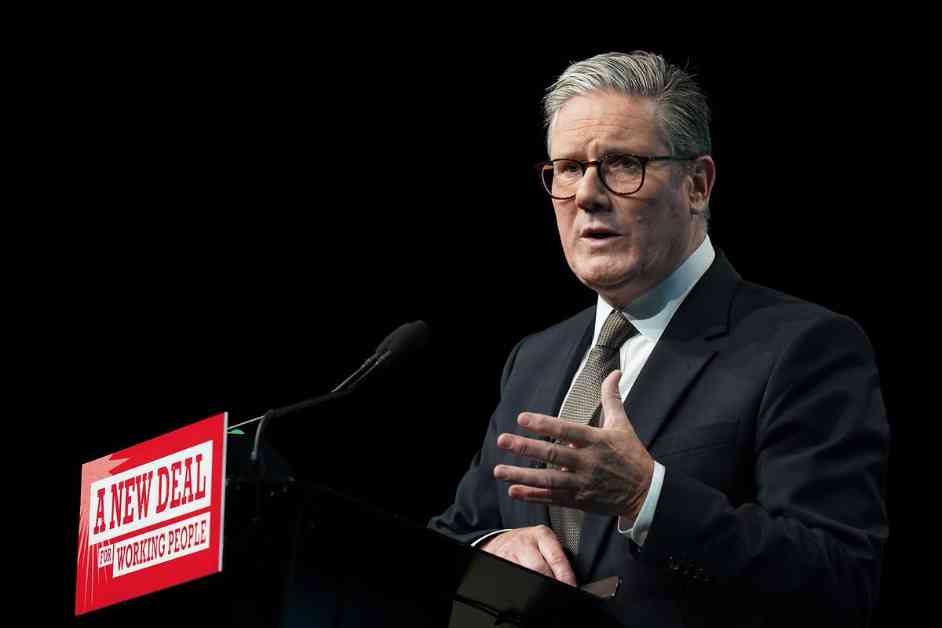Starmer Successfully Defuses Labour Revolt on Winter Fuel Payments
Following a contentious debate in Parliament, Prime Minister Keir Starmer emerged victorious in quelling a rebellion within his own party over proposed cuts to winter fuel payments for pensioners. This significant political test comes at a time when the government is facing mounting pressure to address the country’s financial challenges and make tough decisions to stabilize the economy.
Labour Backbenchers Challenge Starmer’s Austerity Policies
The debate over winter fuel payments reignited criticism of the government’s austerity measures, with some Labour MPs expressing concerns about the impact of cutting essential benefits for vulnerable pensioners. Despite these reservations, Prime Minister Starmer stood firm in his defense of the proposed cuts, emphasizing the need to address the £22 billion deficit in Britain’s finances.
During his speech at the Trade Union Congress (TUC) in Brighton, Starmer reiterated his commitment to making difficult choices and rejecting what he referred to as the “snake oil of easy answers.” This steadfast stance set the stage for a showdown with his own backbenchers, who were divided on the issue of means-testing winter fuel payments.
Rebellion Quashed as Starmer Asserts Authority
In a closely watched vote, only one Labour MP, Jon Trickett, voted against the government’s proposal to cut winter fuel payments, while 53 others abstained. The majority of those who abstained had received permission to be absent from the parliamentary session for other commitments, underscoring the delicate balance of power within the Labour Party.
The prime minister’s ability to maintain party discipline and prevent a wider revolt was seen as a significant victory for his leadership. Despite facing criticism from within his own ranks, Starmer demonstrated his authority and resolve in steering the party through a contentious issue that highlighted the challenges of governing in a time of economic uncertainty.
Opposition Parties Criticize Government’s Decision
While the government’s decision to cut winter fuel payments received support from the majority of MPs, opposition parties voiced their concerns about the impact on pensioners and vulnerable individuals. The Liberal Democrats and Green Party condemned the move as “reckless” and “cruel,” highlighting the potential consequences for those reliant on the payments to cope with rising energy costs.
Age UK, a leading advocacy group for older adults, expressed disappointment with the decision to means-test winter fuel payments, citing concerns about the impact on low-income pensioners. Director Caroline Abrahams emphasized the need for a fairer approach that takes into account the financial challenges facing vulnerable individuals, particularly as energy prices continue to rise.
In response to the criticism, Chancellor Rachel Reeves defended the government’s decision as necessary to address the country’s fiscal challenges. Reeves argued that the move would save the Treasury £1.5 billion this year and help restore the public finances after years of neglect by the previous Conservative government.
Labour’s Balancing Act: Fiscal Responsibility vs. Social Welfare
The debate over winter fuel payments underscored the delicate balance that the Labour Party must strike between fiscal responsibility and social welfare. While some MPs expressed reservations about the impact of the cuts on vulnerable pensioners, others emphasized the need to address the country’s financial challenges and make tough decisions to secure the economy’s future.
Prime Minister Starmer’s handling of the rebellion within his party showcased his ability to navigate complex political terrain and maintain party unity in the face of internal dissent. By standing firm on the issue of means-testing winter fuel payments, Starmer demonstrated his commitment to making difficult choices for the greater good of the country.
As the government moves forward with its plans to implement the cuts, the focus will now turn to ensuring that vulnerable pensioners are adequately supported during the winter months. The debate over winter fuel payments has raised important questions about the role of social welfare in a post-pandemic economy and the need to strike a balance between fiscal prudence and compassionate governance.












